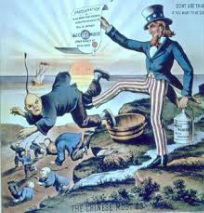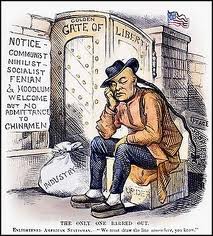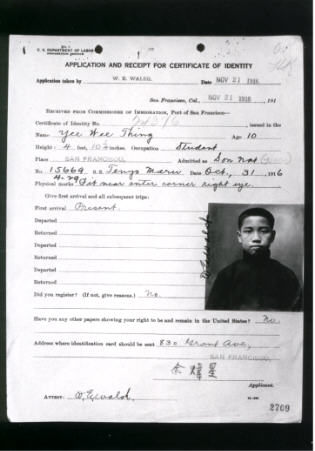1882 Chinese exclusion act
|
|
"Give me your tired, your poor, Your huddled masses yearning to breathe free, The wretched refuse of your teeming shore, Send these, the homeless, tempest-tost to me, I lift my lamp beside the golden door!" - Emma Lazarus 1883
(On the granite pedestal of the Statue of Liberty ) "EXCEPT CHINESE" The past memories of many immigrants coming to the United States during the 19th Century is often echoed through this passage by Emma Lazarus. Not so for the Chinese during this period. For in the previous year, on May 6, 1882, the United States Congress enacted the Chinese Exclusion Act. This act prohibited Chinese immigrating from China for the next ten years under the penalty of imprisonment and deportation (15).
Previous acts had been passed by the United States, most notably the Page Act of 1875 that prohibited immigration of Asian forced laborers and prostitutes and the Naturalization Act of 1790 that prohibited the naturalization of non-white subjects. However, this specific act was the first and only time a Federal law was passed by Congress to prevent entry by an ethnic working group (16) (17). This act subjected Chinese to several criteria. First, it required a certificate from the China government for anyone wishing to immigrate to America to be qualified to immigrate. Second, this law excluded "skilled and unskilled laborers and Chinese employed in mining." The person had to present proof he/she was not a laborer - a feat that was often difficult to demonstrate to officials already set against letting Chinese entering in the first place . Thirdly, certification was not only limited to new arrivals, but also to those Chinese who had already come to America, left and then wanted to reenter. Thus, Chinese men who had already tried to settle in the U.S. would in essence be unable to go back to China to bring back their wives and families. Lastly, all Chinese in America were considered to be permanent aliens, being barred from ever obtaining U.S. citizenship(18). While more than 10,000 Chinese between 1802 and 1902 would file petitions, the Supreme Court of the United States often sided against the Chinese. For example, in the case of Chae Chan Ping v. the United States (1880), the Supreme Court wrote in its final verdict that "the power of exclusion of foreigners [is] an incident of sovereignty belonging to the government of the United States as part of those sovereign powers delegated by the constitution." (19) Often due process, which would normally be allowed in a petition from another ethnic group arriving in the United States, would be ignored in a case involving a Chinese immigrant. Later legislation, such as the Scott Act of 1888 (20) and the Geary Act of 1892 (21), only enabled the Federal government to tightened, extend, and/or prolong the powers of the Chinese Exclusion Act of 1882. As a result of these discriminatory laws to curtail Chinese immigrates to the United States, the number of Chinese Americans, which had previously reached numbers up to 120,000 by the 1900's, fell to about 100,000 by the 1940's and did not begin rising again until the 1950's. (22). |




